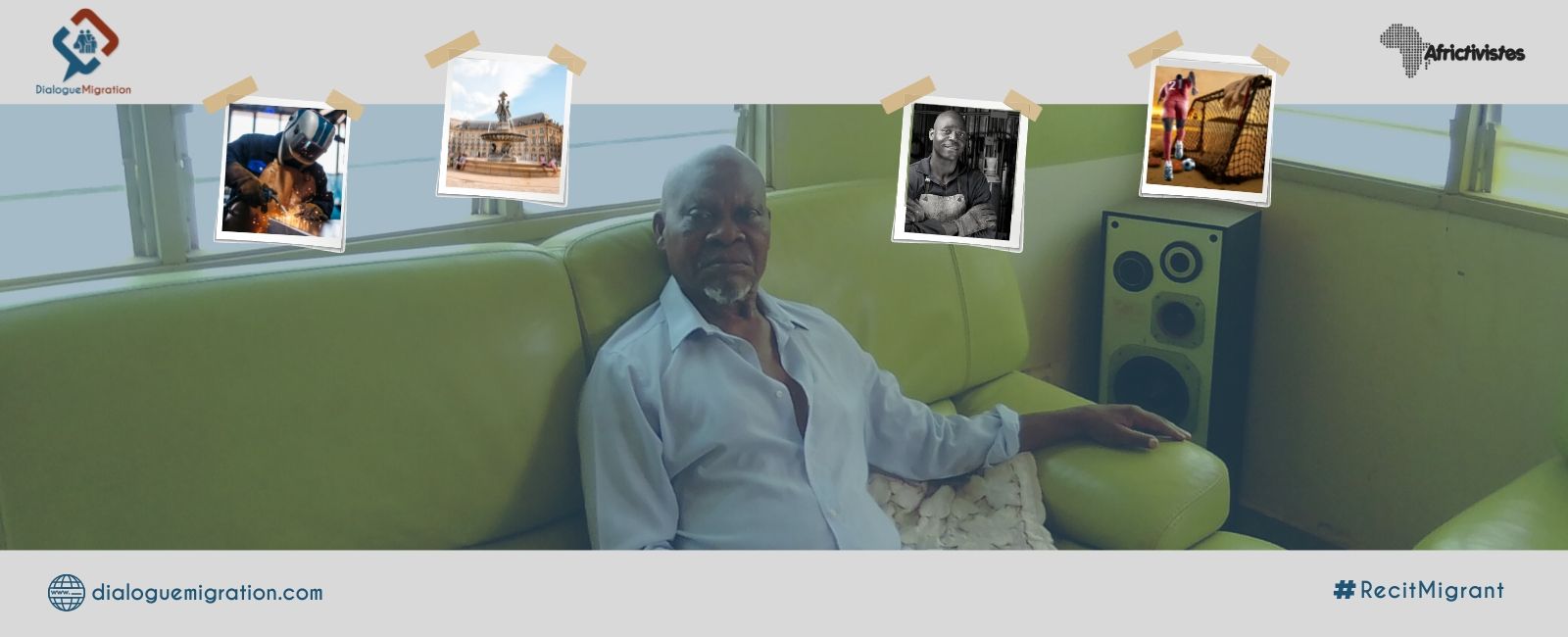

Valère Atiyé returned from Bordeaux on February 28, 2022, after several decades spent in Europe. Since his return to Benin, he has lived in his residence in Abomey Calavi, a suburb of Cotonou. In the quiet of his residence, he now spends his time training young people in industrial welding and sharing his experience with young candidates for migration.
Valère Atiyé was barely 20 years old when he left his native Dahomey (now Benin) to go on an adventure. It was with the approval of his father, then station master at the Benin-Niger Joint Organization of Railways and Transport (OCBN), in Porto-Novo, the capital of the country, that he undertook to go first to Côte d’Ivoire. He will start a career as a professional footballer that he will pursue for two years.
He says that it was during this period that he met a group of young Togolese who would involve him in their project to travel to Europe. He recalls: “It was August 10, 1965.”
Start of the adventure in Europe
When he left, Valère Atiyé had no idea where he was going. In the boat that took him to Europe, Atiye remembers that he was the smallest. “I was hidden under beds and so on. It’s not like today where when you are caught, you are thrown into the sea of sharks…,” he says.
When he disembarks in Bordeaux, he will be hosted by a relative of his travel companions. Two weeks later, luck smiled on him. Looking for a job, he accidentally stumbles upon a Frenchman who hires him to be a warehouseman. After this first experience, he will register for a professional training in welding.
Today, Valère Atiyé is 78 years old. He spent his entire professional career in France and Germany where he worked as an industrial welder. The sexagenarian thus totals 49 years of work. He says he has several qualifications under his belt.
“I have five French approvals : Nuclear power plant; Shipbuilding; Ship repair; Oil, France gas; and Aerospace. And if you don’t have it, you can’t work in each of these sectors,” he confided proudly.
Although there is a lot of controversy around migration, Valère Atiyé believes that it is a necessary evil. “Both for migrants and for host countries,” he pleads.
He gives his own experience as an example during his long stay in Europe: “I worked with old Spaniards who fled their country during the Second World War. As well as Portuguese, Poles, Yugoslavs, who had also fled their country. They were great professionals,” he says. According to him, at the time, they were the best in this field, and “yet, they were migrants,” he notes.
Valère assures that skilled workers still have their place in the world. According to him, what the host countries do not like, “are the so-called + paper-scrapers +”.
Discrimination against black immigrants
Wherever he is, Valère ATIYÈ, defends tooth and nail his African origins. Very aware of the “inhuman treatment” inflicted on migrants from Sub-Saharan Africa during the crossing of the Mediterranean, Valère ATIYÈ points the finger at certain communities in the migration corridors.
Apart from the risks associated with the crossing, Valère ATIYÈ notes the racial discrimination of which immigrants are also victims in their host countries in Europe. “I had to react violently one day in the company where I worked,” he says following racist remarks made by one of his colleagues.
According to him, their boss sided with him by firing the attacker and telling him to go for treatment. This experience marked him a lot, he confides with emotion.
Having been to several European countries, Valère Atiyé says he has met good people, but also bad ones.
He also believes that France, compared to the other European countries he has had to visit, is “a good country”. According to him, in other countries, the inhabitants have no embarrassment to show you their hostilities. “I’ve noticed that they don’t like black people being financially comfortable,” he said. He continued: “It’s as if we don’t have the right to travel and go to them…”
If Valère Atiyé has been able to stay so long in Europe, it is thanks to his dexterity in his profession “It’s because I am a high-precision welder,” he proudly claims.
However, he acknowledges that despite his skills, the salary treatment was not the same for everyone. After years of experience, he found himself in the category of so-called “Bounty Hunters“.
Tips for prospective immigrants
It is on the strength of his experience of half a century that Valère Atiyé allows himself to give advice to candidates for migration. “Going to Europe and being called all names is a choice,” he said. And to continue: “We are not on earth to be mistreated, but rather to play equal card with Westerners, from the moment we can do the same thing,” he advises prospective immigrants. He urges the African authorities to work in the direction of vocational training, which is, according to him, an alternative to move the African continent forward. “Otherwise, we will always depend on others,” he says. Afro-optimistic, Valère ATIYÈ, invites African and especially Beninese youth to know that it is manual work that counts. Also, not to get lost on the way, and avoiding long studies. Contrary to the collective thought that immigrants are only there to invade others, Valère ATIYÈ challenges this perception.
Back in his home country, he is working to reverse the trend so that young people are not forced to take the path of adventure for lack of jobs. And in case they choose this option, let it be with all the chances on their side. “There are some who are called to do long studies; let them do it. I would like to ask decision-makers to give priority to the professional sector and to pay it properly so that young people can take an interest in it and are not discouraged,” he observes. In this dynamic, since his return to Benin, Valère ATIYÈ invests in transmitting his skills acquired during all these years in technical and vocational training centers. And it is with pleasure that he talks about his trade as an industrial welder, and his experiences as an immigrant. For this septuagenarian who crossed the Mediterranean clandestinely by boat, departing from the port of Abidjan, the memories of his journey as an immigrant have not taken any wrinkle.



